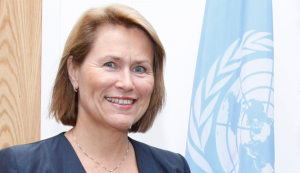UNOPS urges the World to support in the fight against NCDs
Chhay Sophal
Cambodia News
Phnom Penh (24 Sept 2018): Mix of leaders from the private, public and civil society sectors, as well as TB survivors, academics, donors, and not-so-usual actors around the world gather today in New York for the third High Level Meeting on non-communicable diseases (NCDs), the chronic diseases which last for long periods of time and progress slowly.

Speaking in her opening remarks at the launch of the Defeat-NCD Partnership, Grete Faremo, Under-Secretary-General and Executive Director of UNOPS, said that though NCDs have come so much more into focus in recent years with success from dealing with CDs and increasing life expectancy levels by impressive numbers in many countries, millions of people around the world turn to tobacco and alcohol.
“We already have in our hands many of the tools and knowledge to fight this new endemic, if we organize and fund our ambitions. We signal today our shared determination to scale-up action against NCDs…. We know what causes them, how to prevent them, how to treat them, and how to reduce their consequences,” she said.
NCDs include Alzheimer’s, Asthma, Cataracts, Chronic Kidney Disease, Chronic Lung Disease, Diabetes, Fibromyalgia, Heart Disease, Hypertension (High Blood Pressure), Obesity, Osteoporosis, Stroke, Cancer, and several other cardiovascular diseases while Communicable Diseases (CDs) such as tuberculosis and HIV/AIDS can be transmitted from human-to-human.
“I believe that The Defeat-NCD Partnership has all these elements. And with the goodwill and active support of all parties, it stands every chance of success. Of course, much work lies ahead. But I am optimistic that with your energetic support in the spirit of true partnership, we will make strong headway in the fight against non-communicable diseases,” the UNOPS Executive Director said.
This is a critical area of our work and the overall of health-related work totaled more than 430 million dollars last year, and the future demand need more support, she added.
